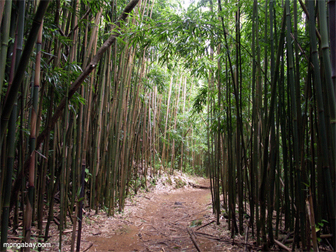Nature helps with ADHD—may even out-perform medication
Jeremy Hance, mongabay.com
October 21, 2008
Children with ADHD are better able to focus after a twenty-minute walk in a natural setting, according to a study published in the Journal of Attention Disorders. The study compared walks in nature to those in urban or residential areas and found that the child’s ADHD improved most after walking in a green space.
The researchers, Andrea Faber Taylor and Frances E. Kuo, kept every other variable of the walk the same. All walks were twenty minutes long; children were accompanied by the same adult for each walk and met with the same researcher afterward to test their attention. Across the board, the children who had taken a nature-walk scored better than those who had walked elsewhere.
 |
"What this particular study tells us is that the physical environment matters," Kuo said. "We don't know what it is about the park, exactly – the greenness or lack of buildings – that seems to improve attention, but the study tells us that even though everything else was the same…we just changed the environment, we still saw a measurable difference in children's symptoms. And that's completely new. No one has done a study looking at a child in different environments, in a controlled comparison where everything else is the same."
Perhaps one of the most surprising finds in the study was that the nature-walk proved as effective as medication—sometimes even more so. “We calculated the size of the effect in our study and compared it to the size of effects in a recent medication study," said Faber Taylor, "and we were surprised to see that the dose of nature had effects the same size or even larger than the dose of medication." None of the children were on their medication during the walk. With the many troubling side-effects of ADHD medication, Kuo believes that spending time in green space is a possible alternative.
 |
Though no one has studied how long this effect of nature lasts, Kuo suspects the impact may be long-term, especially if the child regularly spends time in natural settings. "Some of the previous survey research suggests a relationship between children who regularly play in green spaces and how severe their symptoms are,” Kuo said. “Children who have regular exposure to green spaces have milder symptoms overall. So that's hinting that there may be a persistent effect.”
The effect of nature on people’s general well-being has long been touted, but this is the first study to directly link nature to improved concentration. Taylor believes the study is important for everyone, not just those with ADHD.
"We're all on a continuum of attention…" Taylor said. "ADHD is just at the far end of attention functioning, but there're plenty of us who fall somewhere close to that end of the continuum, and we all experience times when we're mentally fatigued – times when we're less able to focus and do tasks and get easily distracted. The evidence suggests that natural settings can benefit everyone, even children (and adults) who have not been diagnosed with ADHD."
ADHD is a neurological disorder that can greatly affect one’s ability to focus for even short periods of time. The disorder may also cause hyperactivity and impulsiveness. While ADHD is often spoken of as a ‘childhood disorder’, psychologists believe that 2-4 percent of adults currently have the disorder.